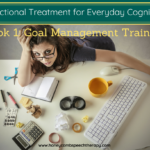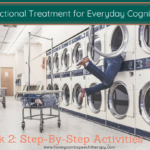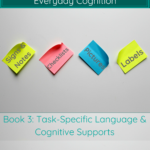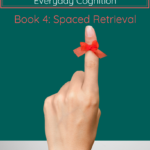Hi SLPs!
With productivity demands, busy caseloads, full extracurricular lives, or kids interrupting your sleep at night (That’s me, currently!), you might notice that while you attempt to read the current research, it’s not always “sticking” for the moments you need to remember some of the key details. And let’s be honest, we don’t exactly have time to thumb through articles or textbooks trying to recall specific recommended guidelines for the population that benefits from a certain treatment.
Today, I’m sharing a simple “Cheat Sheet” that I use to recall evidence-based treatments that can be applied to meet functional goals in cognitive therapy. All of my treatment packets in my store include a simple Cheat Sheet that can be used to decide if a certain treatment would be appropriate for a patient, at a glance.
*Psst: Those of you that received a coupon via social media when this Series began: It expires on 11/2!
If you are just catching up, I have created some great resources that give functional treatment ideas using evidence-based cognitive treatments. Read more:
Book 1: Goal Management Training
Book 2: Step-By-Step Activities
Book 3: Task-Specific Cognitive & Language Supports
Book 4: Spaced Retrieval
When it comes to choosing my treatment methods, I listen for the functional needs during the assessment, and then use a Cheat Sheet like the one below to collaboratively choose a treatment plan with the patient. This way, I know that I am bringing a best practice treatment in to meet a real need for the patient (but also don’t have to rely on my memory to recall all these facts independently during the evaluation! I actually have this printed out):
| Evidence-Based Treatment: | Addresses: | Recommended Population: | Other Info: | Honeycomb Speech Therapy Resource: |
| Metacognitive Strategy Instruction | ·Problem-Solving
·Strategy Use ·Planning ·Organization ·Life Participation
|
-Mild to Severe
-Acute or chronic – Practice standard for brain injury treatment (young adults to age 75). |
*Patient needs basic awareness to be able to “Think about their thinking.”
|
Book 1: Goal Management Training
|
| Systematic Instruction
Errorless Learning |
·Problem-Solving
·Organization ·Life Participation ·Attention ·Memory |
-Moderate to severe impairments most likely to benefit | *Research supports use with TBI, CVA, dementia, amnesia, learning disabilities
|
Book 2: Step-By-Step Activities
|
| Task-Specific Supports
Environmental Modifications |
·Language Needs
·Cognitive Needs ·Life Participation |
-Practice standard for brain injury, pediatrics and adults
|
*Careful consideration of technology vs no-tech recommended | Book 3: Task-Specific Language and Cognitive Supports
|
| Spaced Retrieval | Memory for:
·Action or Skill ·Knowledge or vocabulary ·Use of external support ·Life Participation
|
-Mild to severe
|
Studies have shown success with a variety of dx including dementia, CVA, stroke, TBI, across multiple settings
|
Book 4: Spaced Retrieval
|
What else is in your evidence-based treatment box for functional cognition? I’d love to hear! If this info is new to you, stay tuned for my next post which will include key references (with free links!) that you can use for education.
Purchase Book 1: Goal Management Training, Book 2: Step-By-Step Activities, Book 3: Task-Specific Language & Cognitive Supports, and Book 4: Spaced Retrieval in my store, and stay tuned for other parts to this series!
Make sure you get the latest functional therapy updates: Follow Honeycomb Speech Therapy on Facebook , Pinterest, or Instagram, or sign up for email updates below.



